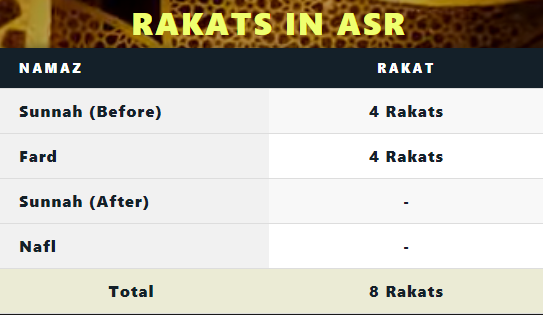Namaz-e-Asr, also known as the Asr prayer, is the third of the five daily obligatory prayers (Salah) in Islam. Understanding the details about the number of rakats (units of prayer) for Asr requires looking into the specific format and sunnah practices.

Obligatory (Fard) Rakats
The Asr prayer consists of four obligatory (Fard) rakats. These rakats are mandatory for all Muslims and must be performed in the prescribed manner and within the designated time period.
Sunnah Rakats
While the obligatory rakats form the core of the Asr prayer, there are also recommended (Sunnah) prayers associated with it. These are not mandatory but are highly meritorious and were regularly practiced by the Prophet Muhammad (ﷺ).
- Sunnah Ghair Mu’akkadah: Some scholars recommend performing four rakats of Sunnah Ghair Mu’akkadah (non-emphasized Sunnah) before the Fard prayer of Asr. However, this practice is not unanimously agreed upon and varies among different Islamic traditions.
Total Rakat Breakdown
- Obligatory (Fard): 4 Rakats
- Sunnah Ghair Mu’akkadah: 4 Rakats (optional)
Scholarly Consensus
- Hanafi School: In the Hanafi school, the emphasis is on performing the four obligatory rakats of Asr. The four rakats of Sunnah Ghair Mu’akkadah before Asr are considered optional and are not strongly emphasized.
- Shafi’i, Maliki, and Hanbali Schools: These schools also agree on the four obligatory rakats of Asr. The practice of performing additional Sunnah prayers before Asr varies, with some scholars encouraging it and others not emphasizing it as much.
Conclusion
The Namaz-e-Asr consists of:
- Four obligatory (Fard) rakats, which must be performed by every Muslim.
- Four optional Sunnah Ghair Mu’akkadah rakats before the Fard prayer, which are recommended by some scholars but not mandatory.
Performing the Asr prayer within its designated time is crucial, and adhering to the Sunnah practices enhances one’s devotion and rewards.